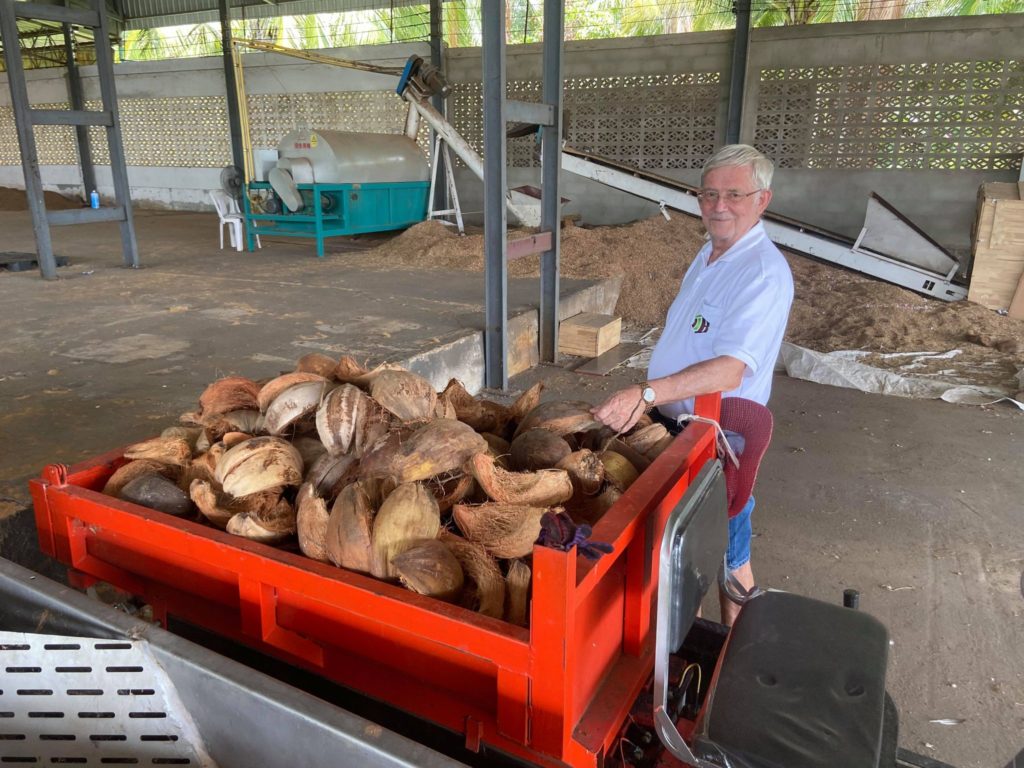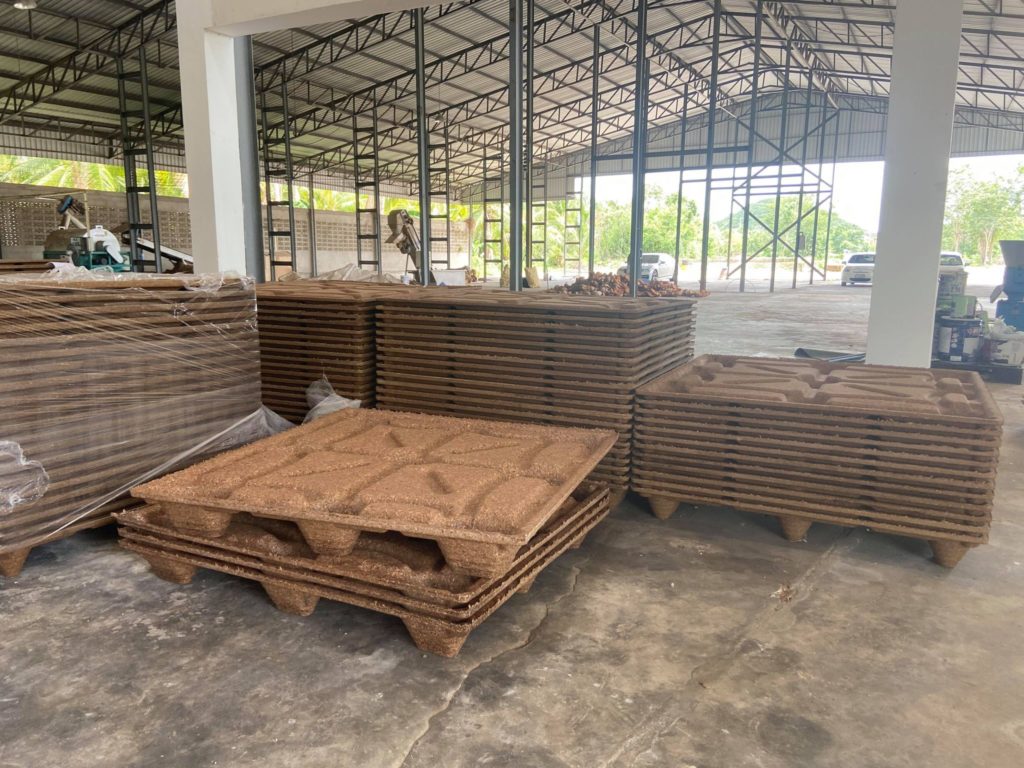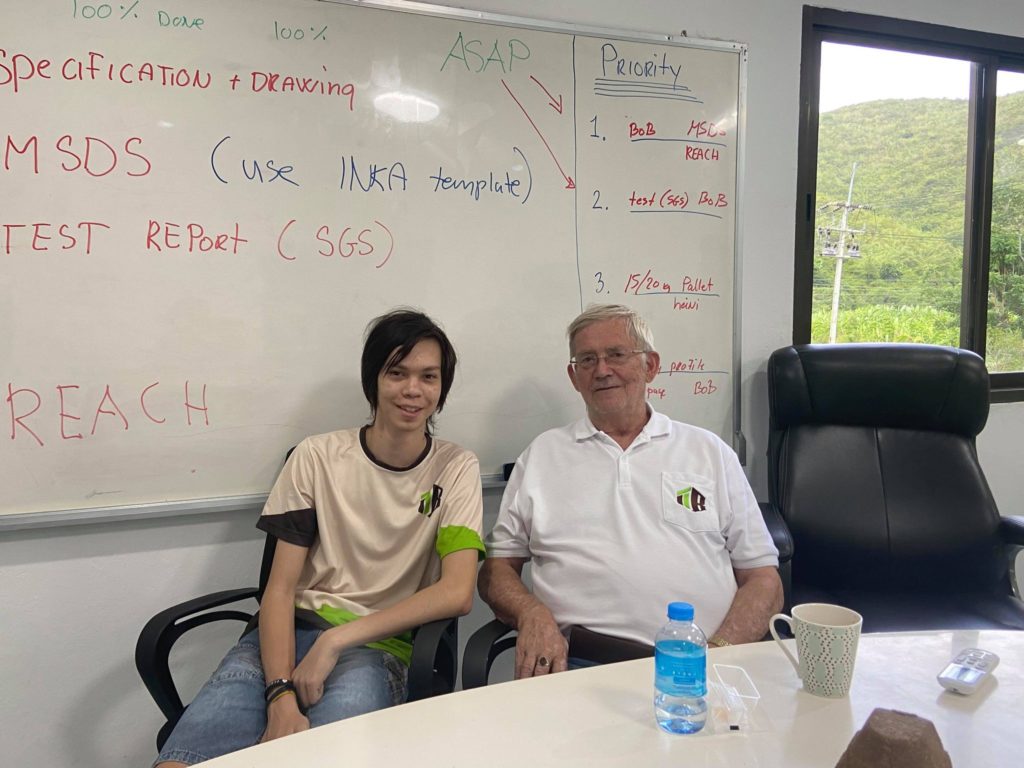
When Heine Joensen moved to Thailand, he thought that he was going to relax. But he quickly found out he could not just lean back and do nothing.
“I need to have a project,” he says.
Heini embarked on a sort of entrepreneurship safari in which he has so far visited many different industries. His ever-changing line of works has included pineapple winemaking, cheese production, coconut oil manufacturing, English teacher – all of them enterprises where it was Heini’s own creations that he would start up, develop and manage.
“I like to work with new stuff. That’s what keeps me young. I develop a new project, I get it up and running and after that I sort of lose interest in it and want to do something else. My whole life has played out like that,” Heini says.
Heini Joensen’s current project is turning coconut waste and waste wood into ecologically sustainable pallets.
An eco-friendly alternative.
Technically, the product is something called presswood pallets named after the technique by which the pallets are made. The pallets have a number of qualities, the biggest one being that the carbon dioxide emission involved with producing of the pallets is smaller than with conventional pallets. The pallets are made from excess material from wood and coconut shells. This material goes through different machines, where it is first grinded to a kind of sawdust. This sawdust is then dried out and then mixed with a a special glue before it is put into a machine that molds the pallets by subjecting the mixture to 14 Mpa pressure and 140 degrees heat.

This process also allows for old pallets to be demolished and then remade into new pallets. Therefor presswood pallets can go through a complete cycle without emitting CO2 by being incinerated at the end of its lifespan, Heini explains.
“Every year 5 billion new wooden pallets are being made. Imagine how much wood goes into that. And then on the other hand there are so much excess wood being burned. So I thought, why not use that,” Heini explains.
Right now, Heini is receiving a lot of wood from rubber trees that the local farmers have started cutting down because of the lack of demand for rubber. These trees would have been burned otherwise, now they are being mixed with the exterior layer of coconut shells and pressed into these pallets.
Another big upside to the presswood pallets is that the process of subjecting the pallets to high heat and pressure creates a pallet that is resistant to termites, bacteria and fungus that conventional wood pallets attracts. There is a requirement to do a disinfection procedure on these pallets by heating them at 56 degrees before transporting them between countries. Presswood – like plastic pallets – don’t have to go through this procedure.
This became a problem for Great Britain last year when they were about to leave the EU. Not being part of the union meant that they now had to live up to the procedure when trading with their former partners. Great Britain didn’t have the kilns to heat all the pallets and lacked the kind of pallets that were excepted from the rule.
The three plagues
Heini and his new company have had some unlucky incidents in its first year despite having had a “witchdoctor” to clear the property of evil spirits.
First Heini found out that the address of the building was not valid. It belonged to the previous business and not the property. Requiring a new address meant that all paperwork had to be redone and this has so far cost him 100.000 Baht. The task of getting a new address is still in process.
The second obstacle was the corona crisis. The pandemic and the ensuing lockdown meant that Heini couldn’t visit any customers.
“Not a single business wanted to see us. We couldn’t make any appointments and show the actual product, which is rather critical when choosing to shift from whatever pallets they were using to a new kind of product,” Heini explains.
Heini was to some degrees able to use his network of former business partners in Europe and Japan to get some almost confirmed orders. But then he faced another problem.
The corona pandemic created what is known at “the container crisis” in the shipping world. Different countries closed various ports that created great imbalance in the distribution of containers and this started a domino effect on the container market worldwide. In Asia there is a big lack of containers at the moment and the shipping companies are profiting from this situation by jacking up the prices on containers on outgoing freight routes from Asia. This has affected Heini’s business a lot and made it nearly impossible for him to export.
“There are still some containers being shipped, but it costs $22.000 for a 40ft container (??) at the moment compared to around $3000 before the crisis started. So, it has put a hold on everything!”
A jack of many trades.
Heini Joensen is a machine engineer by education but his many different occupations through the years have has not reflected that much although the engineer background has been useful from time to time.
Born in Copenhagen as the son of a father from The Faroe Islands and a mother from Frederikshavn, Heini was the odd one out when he went to school in the middle of Nørrebro, Copenhagen. After a life of working for the oil company, Shell, and also setting up in his own kitchen element manufacturing company, Heini fell in love with a Thai woman and decided to try his luck in Thailand.
In all of his business ventures, Heini has been very systematic when building up new projects. Trial and error has been the work method whether he was trying to make a delicious pineapple wine or coming with up with a formula for smooth coconut oil.
There have been many lessons to be learned along the way. In Heini’s previous business, making coconut oil – a business that is still going – he was exporting to Japan. This collaboration required the highest quality standard Heini explains.
“If you can sell to the Japanese you can sell to everyone. They only want the absolute best,” he says.
After being selected among over a hundred different oils, Heini landed a deal with a Japanese importer. But quality assurance was a constant task that they would be reminded of many times when their deliveries where being scrutinized by the perfectionistic Japanese importer. Heini’s company would receive complaints over a couple of dead flies inside the transportation crates or small smudges on the bottle label prints.
“Once we got a complaint about a hair in on the oils. They send a half glass of oil with a hair to show it to us. But I knew we didn’t have hair in our product, so I had the hair DNA-tested and it turned out to be a Japanese pubic hair. That was very embarrassing for them,” Heini laughs.
However, the most important factor for a business entrepreneur to become successful is something as basic as being a sympathetic person, Heini has learned. This is something that he always has in mind whether it comes to talking with authorities to get a food selling permit or when showing a witch doctor around his company propriety.
“People have to like the person you are. It is very difficult to come here and do well without a sense of humility. I’ve seen people coming from abroad and believing they had It all figured out. People with that attitude can sit in a bank for two hours before someone wants to talk to them,” Heini tells.
A family business
Heini’s is (however) optimistic about the future of his current venture, Tropical Bio Pallet. At the time of my visit, the company’s sales and marketing manager, Bob, was in Bangkok trying to land a deal with a Thailand based company. If everything works out it would mean that they could start selling the first batch of pallets.
Once the company is established the plan is for Heini’s son Leon to take over the company.
“The plan is that Leon is taking over five or six years from now when he is done with university,” Heini tells.

After that Heini might start up a new project to add to his collection. He already has one planned he reveals..





I like how these pallets have a ton of qualities. I could use them for more things. Hopefully, I can get my hands on some.
The end goal is for this information collection system which will track all of our trash back home again, preventing any unauthorized disposal or burning methods.